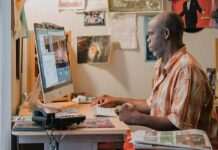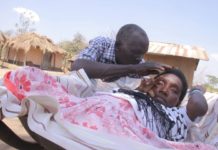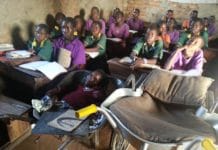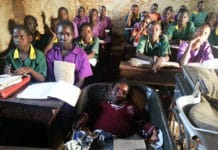by Ronald Galiwango
On Sept. 26, 2013, an article with the title “Disabled and riding a wheelbarrow: a father’s love” explained how Eunice Atim and Sarah Atiano of Uganda, Africa, lacked wheelchairs that could enable them to get around and go back to school. Though the article indicated that Eunice Atim greatly doubted that she’d receive a wheelchair, this happened opposite to what she thought.

When the wheelchairs were delivered to the family, they all became happy and, at this point, Eunice Atim said, “I am sorry I never asked for your name when you first came here because I never knew how useful you could be to us. Can you please tell me your name?” I told her and even mentioned where the support had came from.
After hearing this, Atim asked, “Why haven’t you come with those people who gave us these wheelchairs?” I answered by telling her how the people were far away. But quickly she asked, “How can I thank them?” I never answered her question and she never forced me to answer her.
Joy continued, and neighbors came to see why the family was making such joyful noise. The father at the same time only said, “God bless you and those who supported us.”
After some time, Atim said, “I will never forget you, Ronald Galiwango, and you’re now my best friend.” Before I had even made a reply to her, she said, “Kindly tell me how you plan to get me back to school.”
At that moment I realized that the wheelchairs were only the first step in Atim’s goal to get back to her education. Leroy Moore, Rachel Cohen Rottenberg and I were successful in getting her a wheelchair. However, Atim always had the bigger picture in mind, and she spoke her mind to me about her goals.
When the father had this question, he quickly also asked, “Has Ronald come with a plan of taking you back to school?” I told them that I went to deliver the wheelchairs and I had not come with any plan of taking Eunice to school.

“I told you that I want to be someone important here but now I can’t because you forgot to tell those people that I also needed an education. I really love the wheelchair but also need an education. Thanks for helping me with transport but unfortunately I am going to remain useless because I am not educated.”
After what she said, I kept quiet, just looking on and could speak only a few words. This whole conversation made me think how she felt, because although she now has her wheelchair, her bigger goal has not been answered yet – her education plans. How can she get to school? She can’t push herself, so basically she has finally got a wheelchair be will not be able to move around by herself and thus can’t get to school.
Although Atim now has her wheelchair, her bigger goal has not been answered yet – her education plans. How can she get to school? She can’t push herself, so basically she has finally got a wheelchair be will not be able to move around by herself and thus can’t get to school.
When it got dark, that day of joy had turned into frustration when Atim reminded me to look at the full picture. I went to Amolator Guest House, where I proceeded to think about what to do next. My mind swam around and around trying to determine my next move; then I gently fell asleep.
I met the family the following morning, and Atim told me, “Please tell those people who helped me to get my wheelchair that I want to go to school too. Please.” She turned her eyes away from me and cried. I was immediately forced to shed a tear for the family.
At that moment, I still gave no assurance to Atim about her education, but I also know that Leroy, the San Francisco Bay View newspaper and Rachel Cohen-Rottenberg have provided a piece of her goal and I know that Atim and her family are thankful, but the struggle continues.
How you can help
What Atim needs most is school fees, payment to someone who will push her to and from school, breakfast and lunch while at school, plus other school requirements like books, pens etc.
I made an effort to calculate the sum Atim needs to attend school. In Uganda, one studies three terms to advance to the next class in school. This implies that since Atim has to begin Primary Six, she will have to pay for three terms this year and another three next year.
I’ve calculated that it will cost $301 per term and $903 per year, which will cover all requirements including her transportation service. That amount will work for this year and next year only. It will change after next year because she will then attend a secondary school.
It will cost $301 per term and $903 per year, which will cover all requirements including her transportation service.
I am available for any inquiries, at galiwangoronald@yahoo.co.uk.
Ronald Galiwango is a journalist in Kampala, Uganda. He can be reached directly at galiwangoronald@yahoo.co.uk or through Leroy Moore, founder of Krip-Hop Nation, at Kriphopnation@gmail.com.

 Store
Store









